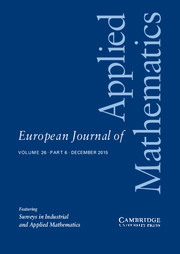-
ISSN:
0956-7925 (Print),
1469-4425 (Online)
-
Editors:
Martin Burger
Computational Imaging Group and Helmholtz Imaging, Deutsches Elektronen-Synchrotron DESY, Hamburg,|and Department of Mathematics, Universitat Hamburg, Bundesstraße 55,20146 Hamburg, Germany,
John King
School of Mathematical Science|University of Nottingham|University Park|Nottingham NG7 2RD,
Michael Jeffrey Ward
Department of Mathematics|121-1984 Mathematics Rd|University of British Columbia|Vancouver BC|CANADA V6T 1Z2,
and
Scott McCue
School of Mathematical Sciences|Science and Engineering Faculty|Queensland University of Technology|O-Block, Level 6, Room O609B-01|Garden Point Campus|2 George St.|Brisbane City QLD 4000|Australia
- Editorial board
EJAM is a journal for original work in areas of mathematics in which an understanding of the application requires the use of new and interesting mathematical ideas. EJAM focuses on the high level of mathematics inspired by real world applications, and at the same time fostering the development of theoretical methods with broad areas of applicability.




Twitter